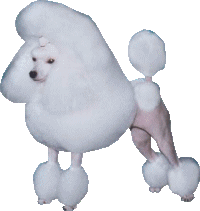Kim's Poodles
History
The Poodle has been known throughout Western Europe for at least 400 years and is depicted in 15th century paintings and in bas-reliefs from the 1st century. The subject is controversial of where the dog was officially developed and no one really knows the breed’s true country of origin. France has taken a claim on the origin, but the AKC gives the honor to Germany, where they say it was used as a water retrieval dog. Other claims have been Denmark, or the ancient Piedmont. What is certain is that the dog was a descendant of the now-extinct French Water Dog, the Barbet and possibly the Hungarian Water Hound. The name "Poodle" most likely came out of the German word "Pudel," which means "one who plays in water." The "Poodle clip" was designed by hunters to help the dogs swim more efficiently. They would leave hair on the leg joints to protect them from extreme cold and sharp reeds. The hunters in Germany and France used the Poodle as a gundog and as a retriever of waterfowl and to sniff out truffles laying underground in the woods. The French started using the breed as a circus performer because of the dog's high intelligence and trainability. The breed became very popular in France, which led to the common name "French Poodle," but the French people actually called the breed the "Caniche," meaning "duck dog.” The Toy and Miniature Poodle varieties were bred down from larger dogs, today known as Standard Poodles. In the 18th century smaller poodles became popular with royal people. The three official sizes are the Toy, Miniature and Standard Poodle. They are considered one breed and are judged by the same written standard but with different size requirements.
Temperament
This highly intelligent dog is one of the most trainable breeds, many excelling in obedience, agility, therapy and service work. The Standard Poodle is generally lower energy and is often calmer than the smaller varieties of Poodles, but can become high strung if not provided adequate and appropriate exercise. The Poodle is sensitive to the tone of one's voice and will not listen if it senses that it is stronger minded than its owner; however, the Poodle will also not respond well to harsh discipline. Owners need to be calm, yet possess an air of natural authority. Poodles are not the type of dog to live outside in a kennel, as they enjoy being with their owners and dislike being alone. Poodles are generally friendly toward strangers, and are good-natured around children.
LIVING CONDITIONS
If given enough exercise, Poodles are relatively inactive indoors. They will be okay in an apartment if they are given enough exercise. A small yard will suffice.
EXERCISE
The Standard Poodle needs to be taken on a daily walk. Although they adore water and love to go for walks, Poodles are not demanding as far as exercise goes, so long as they get their walk in. They however, will keep in better spirits and be more fit if given regular opportunities to run and play off the leash in a safe area. The Standard retains its sporting instincts, has great stamina, and needs more activity than the smaller varieties.
LIFE EXPECTANCY
10 - 18 years
Grooming
Grooming is a must with this breed, how often depends on how short or long you prefer to keep the coat and how much upkeep your willing to do, on average your poodle should visit the grooming shop every 2 to 3 months.
Just for fun...
A few Famous poodle owners
Looking for a intelligent, non shedding, hypoallergenic dog? Look no further...
To better help you find a good puppy match, please fill out the adoption questionnaire below
We are getting so big!
We are getting so big!
Not for sale/previous pups
Just to darn cute of pictures not to share!
Full registration/Breeding rights will be considered on a very limited basis and if your looking to make Poodle mixes, please don't ask.
None available at this time

